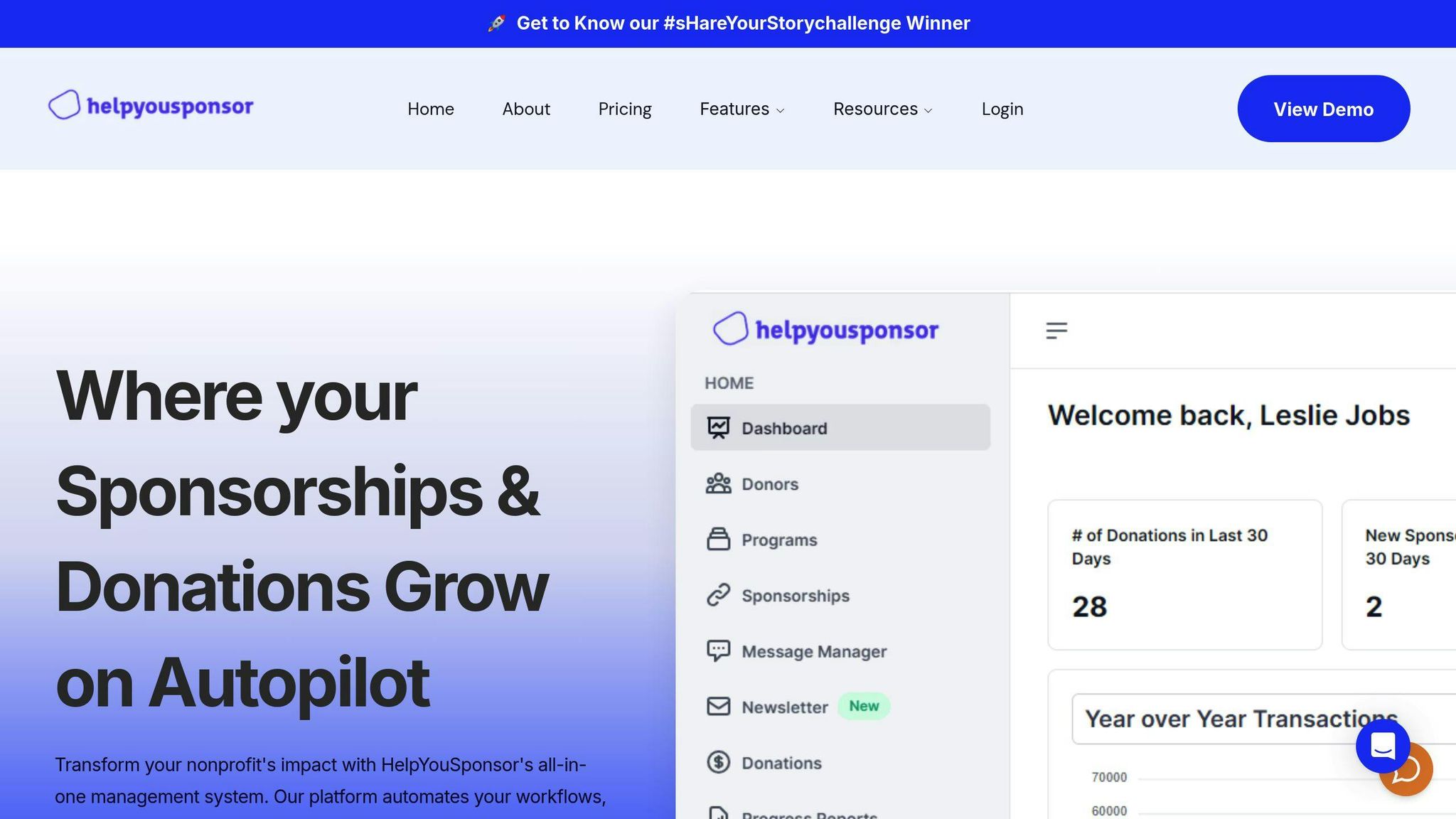Nonprofit Software Guide 2025: From Donor Database to Program Management
Explore essential software tools for nonprofits in 2025, including donor management and program tracking solutions tailored for success.

Nonprofit organizations in 2025 rely on software to streamline donor management, fundraising, and program tracking. Here’s a quick guide to the best tools and features:
-
Top Platforms:
- Bloomerang: Focused on donor retention with segmentation tools. Starts at $125/month.
- DonorPerfect: All-in-one donor and volunteer management. Contact for pricing.
- HelpYouSponsor: Child sponsorship management with free and scalable pricing options.
-
Key Features to Look For:
- Ease of Use: User-friendly design with mobile access and customizable views.
- Integration: Compatibility with tools like QuickBooks and Constant Contact.
- Scalability: Flexible pricing and growth options.
-
Steps to Choose the Right Software:
- Identify your nonprofit’s needs (e.g., workflows, budget, integrations).
- Compare features and costs across platforms.
- Test software with demos and phased implementation.
Quick Comparison:
| Software | Primary Focus | Key Features | Best For | Starting Price |
|---|---|---|---|---|
| Bloomerang | Donor Management | Donor retention tools | Mid-size nonprofits | $125/month |
| DonorPerfect | All-in-One Solution | Donor and volunteer management | Unified system needs | Contact sales |
| HelpYouSponsor | Child Sponsorship | Automated sponsorship tracking | Sponsorship-focused programs | Free (up to 10) |
The right software can save time, reduce errors, and help nonprofits focus on their mission. Start with free trials to find the best fit for your organization.
The Best Nonprofit CRM Solutions for 2024
Types of Nonprofit Software
Nonprofits rely on specialized tools to build stronger connections with donors, simplify fundraising, and improve the effectiveness of their programs.
Tools for Managing Donors
Donor management software helps nonprofits maintain and grow relationships with their supporters. Popular options like Bloomerang and DonorPerfect stand out for their features. Bloomerang offers tools like engagement scoring, donor timelines, and automated messaging. DonorPerfect focuses on targeted outreach through donor segmentation and detailed profiles. Key features of both include:
- Secure data storage with encryption
- Customizable reports for better insights
- Automated thank-you messages to acknowledge donations
- Donation tracking and processing for financial transparency
Fundraising Platforms
Fundraising software has become a must-have for nonprofits. Platforms like Giveffect combine donor management with live campaign tracking and analytics. For event-based fundraising, Mobilize handles attendance tracking, donation processing, and post-event reporting.
Program Management Software
Managing programs effectively requires tools that track outcomes and simplify daily tasks. Zoho Creator allows nonprofits to build custom apps tailored to their specific needs. Meanwhile, HelpYouSponsor offers flexible pricing, including:
- A free tier for up to 10 commitments
- A Pro plan at $39/month for up to 80 commitments
- A Max plan at $0.50 per commitment, with no limits
Many of these tools integrate easily with platforms like Zapier, helping nonprofits automate workflows and keep data consistent across systems.
Choosing the right software starts with understanding your nonprofit's needs and identifying the features that will have the biggest impact.
Features to Look for in Nonprofit Software
User-Friendly Design
Nonprofit software should be easy to navigate, catering to team members with different levels of tech expertise. Here are some features that make a difference:
| Feature | Benefit |
|---|---|
| Mobile-friendly design | Access tasks and data anytime, anywhere |
| Interactive dashboards | Quick insights into key metrics and activities |
| Drag-and-drop functionality | Simplifies tasks without needing technical skills |
| Customizable views | Lets teams create interfaces that fit their workflows |
Tools like Asana and Basecamp are great examples, offering clean, intuitive layouts that help teams stay organized and efficient.
Integration with Other Tools
Software that works well with tools you already use can save time and reduce errors. For instance, DonorPerfect integrates with QuickBooks to simplify accounting and with Constant Contact for seamless email campaigns.
"The ability to integrate with other tools is crucial for maintaining consistent data across systems and automating routine tasks", according to a recent HubSpot Nonprofit Trends Report.
Affordable and Scalable Options
Finding software that's budget-friendly and grows with your organization is key. Here are some cost considerations to keep in mind:
- Implementation costs: Includes training and data migration
- Subscription fees: Many platforms offer nonprofit discounts
- User licensing: Make sure it fits your team's size
- Integration costs: Check for compatibility with your current tools
Bloomerang, for example, starts at $119/month and offers features that expand as your nonprofit grows. Zoho Creator is another option, providing a low-code platform that lets nonprofits design custom applications without needing advanced technical skills.
Steps to Select the Right Software
Choosing the right software helps your nonprofit focus on its mission by minimizing inefficiencies and streamlining operations.
Identify Your Organization's Needs
Start with a clear understanding of your nonprofit's challenges and operational requirements. Create a document that outlines:
- Current workflows and any bottlenecks, including team capabilities
- Data management needs
- Integration requirements with existing tools
- Budget limitations
"Nonprofits face increasing pressure to meet missions while navigating tight budgets and complex decisions", says Kelly Perry from StratusLIVE.
This clarity will guide you in evaluating software options that align with your goals.
Compare Features and Costs
Use a structured approach to compare software options. Here's a framework to help:
| Feature Category | What to Evaluate | Example Benchmarks |
|---|---|---|
| Core Functionality | Donor management, fundraising tools | DonorPerfect ($89/month) vs Bloomerang ($125/month) |
| Integration Capabilities | Email marketing, accounting software | QuickBooks compatibility, Constant Contact integration |
| Scalability | User limits, data storage | Growth-based pricing tiers |
| Support Services | Training resources, technical assistance | Live support hours, onboarding process |
Both DonorPerfect and Bloomerang stand out for their compatibility with accounting tools and email marketing platforms.
Test and Set Up the Software
Follow these steps to ensure a smooth implementation process:
- Initial Assessment: Schedule demos with at least three vendors, focusing on ease of use and automation features.
- Team Testing: Involve key team members in testing the software during trial periods to gather feedback.
- Implementation Planning: Develop a phased rollout plan that includes timelines for data migration, staff training, and system integration.
Many providers, like Bloomerang, offer onboarding assistance to help nonprofits transition smoothly.
With the right tools in place, nonprofits can operate more effectively, paving the way for greater success. Real-life examples of this are explored in the next section.
Examples of Nonprofits Using Software Successfully
Real-world stories highlight how choosing the right software can make a big difference for nonprofits.
Child Sponsorship Programs with HelpYouSponsor

HelpYouSponsor is designed to simplify managing child sponsorships. It offers tools like automated matching, secure payment handling, and detailed reporting. Here's what makes it stand out:
| Feature | Advantage |
|---|---|
| Automated Relationship Management | Makes sponsor matching and tracking ongoing commitments easier |
| Secure Payment Processing | Safeguards donation transactions |
| Impact Reporting | Creates detailed reports to show the effects of sponsorships and ensure accountability |
Donor Management Success Stories
Modern donor management tools are changing how nonprofits connect with their supporters. Below are two standout examples:
Local Food Bank Transformation
A local food bank adopted DonorPerfect to streamline donor and volunteer management. By automating these tasks within one platform, they saved hours each week and boosted both efficiency and donor engagement.
Bloomerang's Role in Donor Retention
Nonprofits using Bloomerang have seen clear improvements in donor retention. Its segmentation tools allow for personalized, data-driven outreach, which has led to:
- Better donor communication
- Higher retention rates
- Smarter resource use
- Stronger fundraising results
These examples show how the right tools can reshape nonprofit operations, leading to better engagement and a stronger impact.
Conclusion: Using Software to Improve Nonprofit Work
Overview of Recommended Tools
The nonprofit software landscape in 2025 offers tools designed to simplify operations and strengthen donor relationships. Here are three standout platforms:
- Bloomerang: Focused on improving donor retention with data-based tools, starting at $125/month.
- DonorPerfect: Combines donor and volunteer management into one system, saving time with automation.
- HelpYouSponsor: Offers pricing that adjusts to the size of your organization, specializing in child sponsorship programs.
Comparison Table of Software Options
| Software | Primary Focus | Key Features | Best For | Starting Price |
|---|---|---|---|---|
| Bloomerang | Donor Management | Tools for boosting donor retention | Mid-size nonprofits focused on donors | $125/month |
| DonorPerfect | All-in-One Solution | Donor and volunteer management | Organizations needing a unified system | Contact sales |
| HelpYouSponsor | Child Sponsorship | Tools for automating sponsorships | Programs centered on sponsorships | Free (up to 10 commitments) |
The nonprofit sector continues to embrace software as a way to tackle challenges and create meaningful connections. As Kelly Perry from StratusLIVE puts it:
"At StratusLIVE, we view this evolving landscape not as a set of roadblocks, but as an opportunity to innovate, collaborate, and grow together"
Choosing the right platform means finding one that fits your organization's goals, budget, and workflow. Factors like ease of use, integration options, and scalability are crucial. These tools are not just about managing data - they help nonprofits build relationships and achieve measurable results.
Start with free trials to see how these platforms work for your team. By adopting the right tools, nonprofits can overcome operational hurdles and make a bigger impact, strengthening ties with both donors and those they serve.

